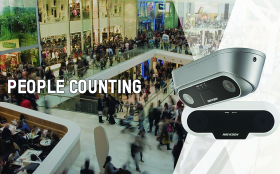

Counting people who enter your mall or store throughout the day can help you to improve your operations in a number of ways. It becomes possible, for example, to precisely increase the number of staff during busy times to improve service on the shop floor, and to reduce staff during quieter times to increase your operating efficiency. You can also more accurately predict demand over the coming days, weeks and months and accurately plan your future activities based on right-sized staffing and inventory.
In these ways, counting people in store can help retailers optimise their strategies and maximise conversion and revenues. However, the task of accurately counting customers over an extended period of time is a difficult one, particularly as legacy camera technologies are not always up to the task.
People counting provides valuable insights across a range of industries and use cases. It can help to ensure crowd safety in high-traffic-flow areas such as stadia, for example, as well as ensuring that the number of people entering clubs, exhibition halls and other locations does not exceed fire safety guidelines.
Historical ‘single-lens’ people-counting challenges
In the past, retailers often attempted to count people in store using single lens cameras. These often mistook people for other objects, leading to inaccurate counts and misleading information about who has visited the store and what they do there.
One major problem with single lens cameras is that they have no 3D perspective, which makes it impossible to understand how tall an object or person is. This means that all kinds of inanimate objects can be mistaken for people, from shopping carts to baby carriages. The problem can be exacerbated when there’s a change in light conditions, and even shadows have contributed to inaccurate people counts in some cases.
To overcome all of these challenges, forward-thinking retailers are installing next-generation dual-lens cameras in store. These record and process two images of a person concurrently, allowing a 3D image to be created. This accurately records the person’s height and shape, identifying them positively as a human being, rather than an object or shadow, for example.
The best dual-lens cameras are also equipped with artificial intelligence (AI) and machine learning (ML) technologies that allow cameras to ‘learn’ over time. It becomes possible, for example, to gain new insights into customer preferences based on their demographics and in-store behaviours, leading to more effective merchandising decisions.
Security requirements with the same camera
The other major benefit of smart people-counting cameras is that they can double as security protection for your mall or store. This means that you can look after your customers and your assets, and accurately count people coming into the store – all with a single investment. With only one set of cameras, you can make significant savings on installation, energy consumption, maintenance and support – while also getting the very best in surveillance and smart retail insights.
Hikvision’s people counting cameras deliver benefits. First, they offer high accuracy, with a dual-lens configuration that provides 3D imaging to distinguish people from inanimate objects and shadows. Hikvision’s cameras also incorporate deep learning algorithms that can be continuously trained and improved with new datasets to count people more precisely.
For more information contact Hikvision South Africa, +27 10 035 1172, [email protected], www.hikvision.com
| Tel: | +27 10 085 8300 |
| Email: | [email protected] |
| www: | www.hikvision.com/africa/ |
| Articles: | More information and articles about Hikvision South Africa |
© Technews Publishing (Pty) Ltd. | All Rights Reserved.